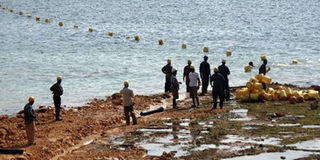Kenyan firms urged to host data locally

Photo/FILE
Marine divers fit the fibre optic cable in Mombasa on March 8, 2009.
As Kenya counts losses arising from cable cuts that happened three weeks ago, companies have been advised to use local hosting for their websites and data.
This, it is hoped, will help reduce disruption of their services.
The cuts have forced Kenyans to endure slow or completely no access to their emails and websites, since most firms are hosted by companies abroad.
“If we were hosting most of our traffic locally, we would not be having such a big slowdown and it would be a better experience for the end-user than the mess we are in now,” says Mr Barry Apudo, a senior technical officer at Telecommunications Service Providers Association of Kenya.
By being hosted abroad, it means internet traffic has to use international fibre cables such as the Seacom, Teams and Eassy, which connect the country to the other regions of the world.
“Hosting locally is better because the host company can manage and service the data centre better. Companies that host locally must be encouraged.
Part of this process includes having as much local content as possible and digitising and automating processes within the private and public sector,” said Kenya ICT board chief executive Mr Paul Kukubo.
According to the Information and Communication permanent secretary Dr Bitange Ndemo, Kenyans should start promoting local hosting of traffic by embracing local e-mails instead of the normal yahoo or google addresses.
Currently, most local websites are hosted abroad with only 14,000 .ke domains.
According to the regional development manager for Internet Society in Africa and chief technical officer at the Kenya Internet Exchange Points Mr Mwangi Michuki, the country has enough capacity to host all local websites.




